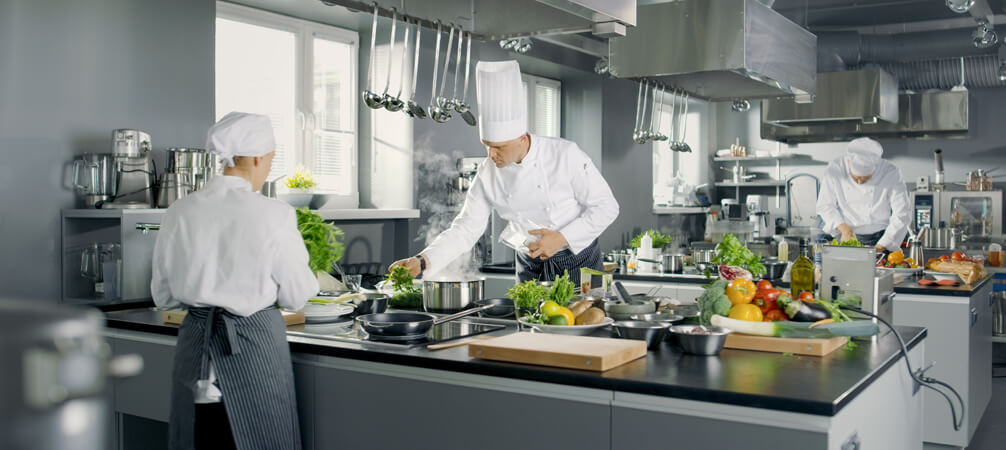Ghost kitchens, also known as cloud kitchens, dark kitchens, or virtual brands, have exploded in popularity. They offer a flexible, lower-overhead way to enter the food industry without the traditional costs of a full-service dining space. However, while the business model may differ, one thing remains the same: risk. If you’re operating a ghost kitchen, whether as a standalone concept or an extension of an existing restaurant, you still need insurance. In fact, your needs might be more complex than you realize.
In this blog, our restaurant insurance company will break down what ghost kitchen operators need to know about protecting their business.
You Might Not Have a Dining Room—But You Still Have Liability
Just because your customers don’t sit down at a table doesn’t mean you’re off the hook for the risks restaurants face daily. Ghost kitchens still prepare food, employ staff, and rely on delivery partners. That means you’re still exposed to:
- Slip and fall accidents (for staff, drivers, or vendors)
- Kitchen fires
- Equipment failure
- Foodborne illness claims
- Third-party delivery disputes
If someone gets sick from your food, they’re not going to care whether you operate out of a ghost kitchen or a traditional restaurant. General liability insurance helps protect your business from claims related to bodily injury and property damage. It’s a must-have, no matter how “virtual” your operation is.
Commercial Property Coverage Still Applies
Even if you don’t own the kitchen facility, your business probably uses expensive equipment, inventory, and supplies. If a fire, flood, or break-in affects your space, who’s covering the loss?
Commercial property insurance can protect things like:
- Cooking equipment
- Refrigerators and freezers
- Raw ingredients and inventory
- Business computers or tablets used for order processing
Be sure to clarify with the facility owner (if you’re renting space in a shared ghost kitchen) who’s responsible for what. Some leases cover shared spaces but not your suite or gear.
Workers’ Comp Is Still Required
Many ghost kitchens employ cooks, prep staff, dishwashers, and managers, just like any traditional restaurant. If someone gets injured on the job, you need to be covered. Workers’ compensation insurance is legally required in most states for employers with employees. It helps cover medical expenses, lost wages, and potential legal fees from workplace injuries.
Food Delivery Adds Another Layer of Risk
Delivery is the lifeline of any ghost kitchen. Whether you use DoorDash, Uber Eats, Grubhub, or your drivers, you face added risks.
Here’s what to keep in mind:
- If you use third-party platforms, you still may be liable for food safety and delivery issues under your brand name.
- If you have in-house drivers, you’ll need commercial auto insurance or hired and non-owned auto coverage, especially if they’re using personal vehicles for business tasks.
Delivery-related claims can become complicated quickly, so ensure your policy covers the methods you use to deliver food to customers.
Cyber Liability for Online Orders
Ghost kitchens are inherently digital. Most orders come through apps or websites, which means you’re collecting customer data, payment info, and relying heavily on tech to stay in business. A data breach or software outage could expose your business to severe losses.
Cyber liability insurance can help cover:
- Legal fees
- Data recovery
- Notification costs
- Ransomware attacks
- Lost income due to digital downtime
It’s a smart addition for any tech-dependent business, particularly in the food delivery sector.
Don’t Forget About Branding & Reputation
Many ghost kitchens operate multiple virtual brands out of one kitchen. That means your marketing, logos, and brand identity are critical assets—and they’re worth protecting. Business interruption insurance and product liability coverage can help you recover if something damages your reputation or disrupts service, especially in a highly competitive delivery market.
Ghost Kitchen Insurance Isn’t Optional—It’s Foundational
Ghost kitchens are nimble, digital, and cost-efficient, but they’re still businesses with very real risks. Business insurance gives you the protection and peace of mind to grow sustainably without betting the house every time something unexpected happens. Whether you’re renting space in a commissary kitchen or building a full-scale virtual brand empire, make sure your insurance grows with you.
At Restaurant Pro Insurance, we specialize in helping food businesses navigate the modern risk landscape. Want to ensure your virtual brand is adequately protected? Reach out today.

